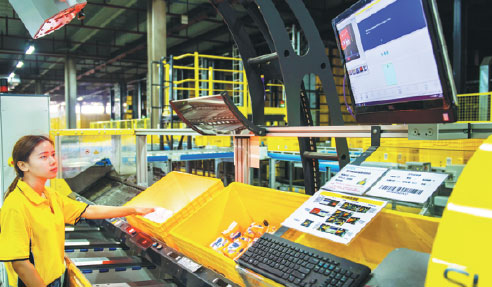Policies to boost private economy


The entrepreneurial and innovative flame will burn bright in China as the country's top leadership pledged to continue offering private companies assistance, such as removing the tax burden and solving financing issues, said a top executive of one of the nation's largest retailers by revenue.
Zhang Jindong, chairman of Suning Holdings Group Ltd, said with the deepening of China's reform and opening-up policy, private companies have the confidence and capability to create more economic and social value, as well as to support the country's ongoing consumption and industrial upgrading.
His comments came after President Xi Jinping, at a meeting on Nov 1, called for providing more support for the non-public sector, including building a fairer competitive environment and safeguarding private enterprises and their wealth.
Xi said the government will unswervingly encourage, support and guide the development of the non-public sector and support private enterprises to move toward a broader stage.
"Over the next three years, we will open 20,000 new smart retail stores, expand the service based on the customer-to-business model, collaborate with more manufacturers to develop intelligent manufacturing, and set up poverty-alleviation training workshops in 100 counties," said Zhang.
Suning will also deploy more resources to expand cross-border e-commerce and start a large-scale overseas procurement program, he said.
The Nanjing, Jiangsu province-headquartered group saw its online and offline sales jump 42 percent year-on-year in the first three quarters of this year, thanks to consumers' diversified demand in both the domestic and global markets.
The company ranked second among the top 500 non-State owned enterprises in China with revenue of 557.9 billion yuan ($80.5 billion) in 2017, after Huawei Technologies Co, according to data released by the All-China Federation of Industry and Commerce in late August.

Eager to enhance its earning ability, Suning brought a number of its products, from logistics robots and big data service solutions to Australian milk tea and fruit, to the ongoing first China International Import Expo in Shanghai.
During the CIIE, it plans to import at least 5,000 kinds of products and services that have not been sold in the domestic market, and import $17.24 billion worth of imported goods from global markets. Zhang said the group will not only develop smart retail systems throughout China in the coming years, but also plans to expand its presence in areas such as logistics, finance, sport, culture and investment to further diversify its development.
With new measures to support the private sector, more favorable policies are expected be rolled out soon. The difficulties faced by private companies are just a natural part of development, and will gradually be solved with effective solutions, an expert said.
"As private companies and entrepreneurs are once again reassured by the central authorities, their potential will be unleashed more as China's economic strength is further improved," said Li Gang, vice-president of the Chinese Academy of International Trade and Economic Cooperation.
- Nanchang funds 19 free funeral venues after tragedy
- Massive ice sculpture replicates CNS?Liaoning aircraft carrier
- China to enhance to improve carbon footprint
- Experts advocate vaccinations to combat flu cases
- Singer Lu Han apologizes for inappropriate behavior
- Xi stresses winning tough, protracted and all-out battle against corruption





































